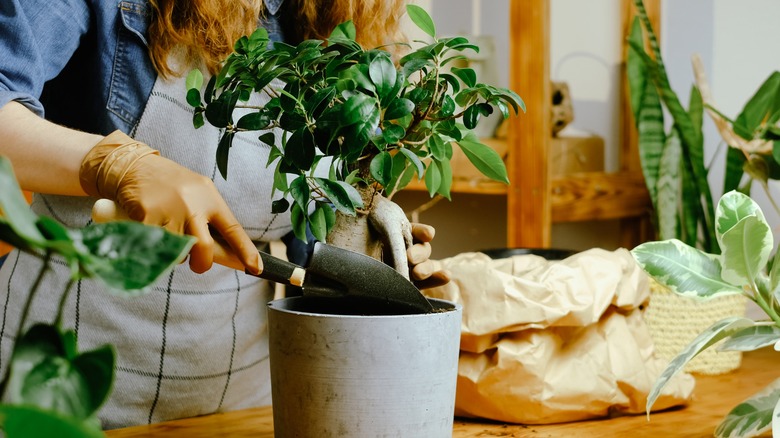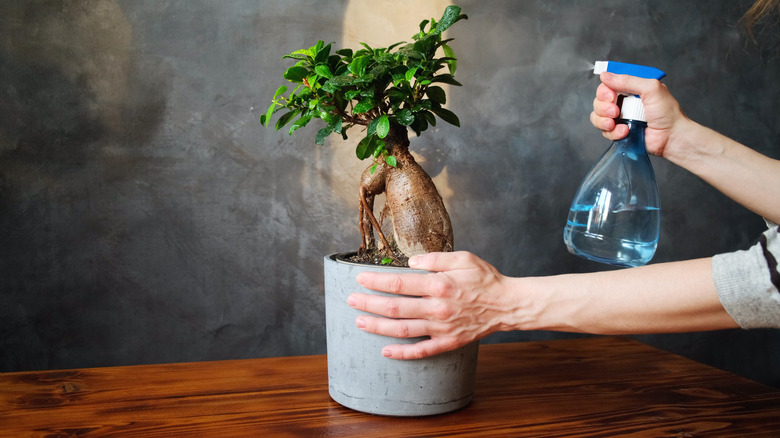Naturally Clean The Air In Your Home With This Easy-To-Care-For Plant
If you notice a lot of dust collecting in the corners of your home, dust particles floating in the air, and mildew forming in the bathroom from high humidity, then your home has poor air quality. We've all heard that having plants inside the house can improve the air quality, which they do by removing toxins and pollutants from the air with carbon dioxide. However, it can be challenging to keep plants alive if you don't consider yourself a plant whisperer. Incorporating easy-to-care-for plants can help improve the air quality in your home and make it easy for you to look after them. The ficus ginseng is a superb example of a plant that's easy to care for and will clean your home's air.
Having too many pollutants inside the house can cause allergies, fatigue, dizziness, and respiratory issues. Pollutants can come from sources inside and outside the house through cleaning supplies, cooking appliances, or smoke. Even though you won't stop using items that affect your home's air quality, having a few houseplants can help reduce the risks. The ficus ginseng targets two common toxins in furniture and cleaning supplies: ammonia and formaldehyde. Plus, it brightens up any room with its large, glossy leaves.
Ficus ginseng wipes out ammonia and formaldehyde toxins
Ficus ginseng plants work as natural air filters, eliminating pollutants by absorbing toxins and releasing oxygen. Unless we use natural ingredients and create our own cleaning solutions, we likely buy cleaning supplies filled with various chemicals.
Disinfectant sprays, carpet cleaners, surface cleaners, and other cleaning products have ammonia to dissolve dirt and grime without leaving behind streaks, but coming into contact with these cleaning products can affect our bodies and environment. For instance, if you accidentally spray the product on your skin, you could develop a rash or burn. If you inhale the scent often, it could harm your respiratory system. When cleaning, having a ficus ginseng plant around will allow it to absorb the ammonia so that the effects aren't as strong.
Meanwhile, building materials such as glue, paint, fabric softeners, and fertilizers contain formaldehyde, a flammable gas with a potent odor. Formaldehyde exposure can lead to health risks such as eye, skin, throat, and nose irritation, and sometimes various cancers when exposed at high levels. While the ficus ginseng won't absorb every toxic particle, it will reduce them tremendously.
The ficus ginseng requires minimal care
While you can welcome multiple plants into your home to improve the air quality, they'll only do their job if you keep them alive, which is the challenging part. However, the ficus ginseng plant is one of the easiest plants to care for, even for first-time plant parents. It adapts to any environment, whether you have a sunny or a shady home. It needs bright, indirect light, so keep it out of direct sunlight. Too much sun can turn its leaves yellow. It prefers morning sun to afternoon heat, so choose an appropriate area in your home.
Further, it's also one of the most forgiving plants you could have in your house. If you neglect and forget to water it, it won't hold a grudge against you. It can survive a long time before it gives up. Watering your ficus ginseng once a week when you first get it is ideal, and over time, you can adjust its needs to how its soil feels. It does despise soggy soil, so ensure you don't overwater it. However, if you notice your plant dropping leaves, it needs more water.
In addition, you want to use the right potting mix to avoid its roots rotting. Using well-draining soil with perlite and orchid bark can help keep the soil loose and allow the water to properly hydrate the roots. Over time, you'll get into a routine with your plant and see how well it improves the air quality in your home.


